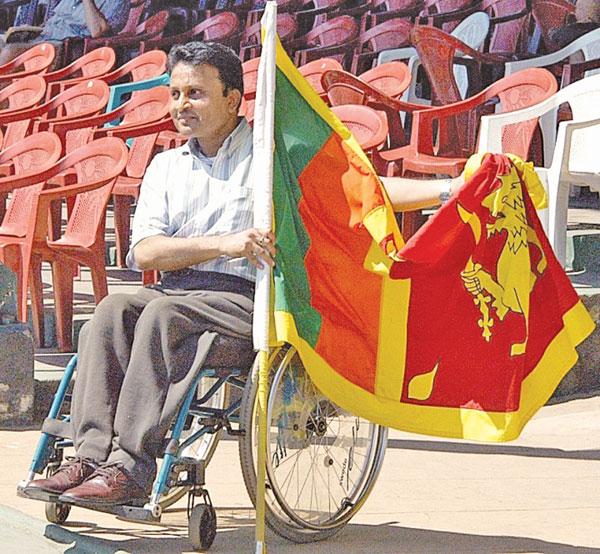
The country’s highest court moved to safeguard the rights of persons with disabilities last week, when it ordered eight government institutions to make their premises easily accessible to citizens who suffer physical disability and problems with mobility.
The historic judgement is a result of legal pursuits by long-standing activist for persons with disabilities, Dr Ajith C.S. Perera.
Dr Perera is the Chief Executive and Secretary General of IDIRIYA and has achieved his second legal victory against the State, after the Supreme Court pronounced that the failure to make public institutions accessible to disabled persons is an infringement of Fundamental Rights by the State. Last week’s judgment also granted costs of Rs 50,000 to the petitioner, Dr Perera.
Supreme Court Justices Prasanna Jayawardena, PC, J. V. K. Malalgoda, PC and Murdu N.B. Fernando heard the case and Justice Jayawardena delivered the judgement last Thursday (18).
Accordingly, last Thursday the Supreme Court held ‘To conclude, we declare that the fundamental rights guaranteed by Article 12 (1) of the Constitution to the petitioner and other persons with disabilities who are similarly circumstanced, have been violated by the State and its agencies, including those coming under the purview or control of the ministries named as respondents’.
The court further issued a direction to the respondents and the secretaries to ministries named as respondents, to take effective measures to comply with existing regulations in respect of public buildings. The court also directed respondents and secretaries to ministries to issue forthwith, to all local authorities, 26 government departments, boards, statutory institutions, State agencies and public officers under the purview of the 1-8 respondents in the fundamental rights application, specifying that approvals for the construction or renovation of public buildings, public places and places where common services are available shall not be granted unless the building plans, designs and drawing relating to such construction or renovation, comply with the provisions of the Disabled Persons (Accessibility) Regulations.
The Supreme Court also directed that prosecutions be instituted in the Magistrate’s Court under the provisions of the Act, in instances where it is detected that there has been a breach or failure to comply with regulations about public buildings.
Justice Jayawardena in his judgment highlights that in the 2012 census, the Department of Census and Statistics reported that an estimated 8.6 percent of the population in Sri Lanka have some form of disability. “That means one in every twelve people in the country has to deal with his or her disabilities in the course of living their day-to-day lives. This is not the case only in Sri Lanka,” the judgment observed.
“We are all vulnerable to disabilities, temporary or permanent, especially as we grow old. In most countries, at least one person in 10 is disabled by physical, mental or sensory impairment.....Persons with disabilities encounter many disadvantages. They are often the poorest and the most excluded members of society. Yet they routinely show tremendous resilience and achieve great heights in all spheres of human endeavour,” the judgment continued.
Quoting the Secretary General of the United Nations on the occasion of the `International Day for Persons with Disabilities in 2009’, Justice Jayawardena’s masterfully worded judgment noted: “Ban Ki-moon was referring to the spirit of resilience and commitment to achievement which persons with disabilities share with others in the community. That spirit and commitment was well illustrated when Helen Keller, who was left blind and deaf at the age of 19 months as a result of a disease and went on to graduate phi beta kappa from Radcliffe College and become a famed author, traveller and social and political activist, declared “I am only one; but still I am one. I cannot do everything, but I can still do something; I will not refuse to do something I can do.”
The `Disabled Persons (Accessibility) Regulations No. 1 of 2006 as amended by the Regulation dated 18th September 2009, specifies the manner in which various parts or areas of public buildings, public places and places where common services are available, shall be designed so that persons with disabilities can safely and easily access those places, the petitioner said in his application to the Supreme Court. The Regulations also declare that all existing public buildings, public places and places where common services are available, must be brought into conformity with the provisions of the Regulations within an aggregate period of 11 years from when the Regulations became operative.
Minister of Social Services and Social Welfare and the Chairman of the National Council for Persons with Disabilities Daya Gamage, Minister of Provincial Councils, Local Government and Sports Faiser Musthapa, Minister of Housing and Construction Sajith Premadasa, Minister of Megapolis and Western Development Patali Champika Ranawaka, Minister of Education Akila Viraj Kariyawasam, Minister of Justice and Prison Reform Thalatha Atukorala, Sri Lanka Tourism Development Authority The Urban Development Authority and the Attorney General were named as respondents in the application.
Dr Perera, appearing in person before the Supreme Court, made this application in the public interest and on behalf of a large number of people in Sri Lanka who have physical disabilities which impede their mobility. He filed the application to secure their basic human dignity, the petition noted.
